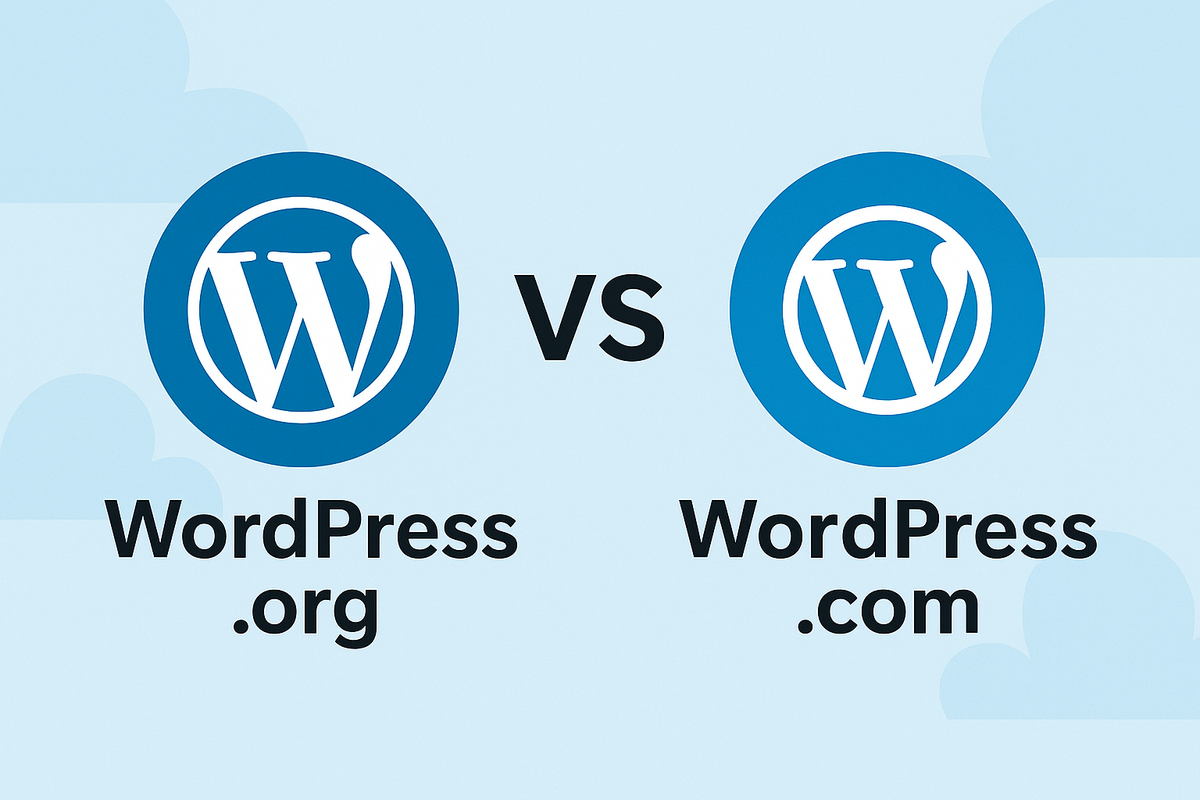WordPress.com vs WordPress.org: What’s the Real Difference?

If you’ve spent even a few minutes researching how to start a blog or website, you’ve probably come across WordPress. It’s everywhere. In fact, more than a third of the internet runs on it. But then you notice something strange: there are two versions. WordPress.com and WordPress.org.
At first glance, it feels like a trick. They share the same name, the same logo, and even the same origin story. Yet choosing the wrong one can completely change your experience of running a website. So what’s the real difference between the two? And more importantly — which one should you use?
WordPress.com: The All-Inclusive Package
Let’s start with WordPress.com. Think of it as the “managed” version of WordPress. When you sign up, you don’t have to worry about hosting, servers, or security updates. Everything is bundled together under one roof.
It’s a bit like renting a fully furnished apartment. The bed, the sofa, the kitchen appliances — they’re all already there. All you need to do is move in and start living.
For someone who wants absolute simplicity, this is a huge relief. You can create a free account, pick a design, and your site is live in minutes. You don’t even need to buy hosting separately. The trade-off, though, is control. Because everything is managed for you, there are limits. You can’t install every plugin you want. You can’t dive deep into the code. And unless you pay for higher-tier plans, you can’t even monetize fully with ads or affiliate links.
So WordPress.com works beautifully for hobby bloggers, personal journals, or people who want a stress-free setup. But if you’re serious about building a brand, a business, or a fully customizable site, those restrictions quickly become frustrating.
WordPress.org: The DIY Powerhouse
Now let’s talk about WordPress.org — often called “self-hosted WordPress.” This is the version that gives you the actual WordPress software. It’s free to download, but you’ll need to set it up on your own web hosting account.
That may sound intimidating, but most hosting providers today make it ridiculously easy. With a single click, you can install WordPress.org and start building your site.
The magic here is freedom. You can install any theme, any plugin, and customize every single part of your website. Want an online store? Add WooCommerce. Want advanced SEO features? Install Yoast. Want a membership site, a portfolio, or a digital magazine? All possible.
It’s like owning a piece of land instead of renting an apartment. You can build whatever house you want, expand it, repaint it, and knock down walls if you feel like it. The responsibility is higher — you’ll need to handle backups, updates, and security (or use plugins to help you). But in exchange, you own everything, and no one can tell you what you can or cannot do with your website.
Which One Should You Choose?
Here’s where most beginners get stuck. Both options let you “have a WordPress site,” but the choice depends on your goals.
If you just want a personal blog, a small website to share updates with family, or a simple online journal, WordPress.com is more than enough. It’s hands-off, quick, and free to start. You won’t need to worry about technical details, and you’ll get a professional-looking site in minutes.
But if your goal is bigger — starting a business, running an affiliate site, selling products, or building something that grows with you — then WordPress.org is the better choice. It gives you the flexibility and ownership that serious projects require. You’ll have to learn a little more, but the trade-off is total freedom.
A Different Way to See It
To put it simply:
- WordPress.com is like renting. You get simplicity and peace of mind, but you’ll always be living by someone else’s rules.
- WordPress.org is like owning. It comes with more responsibility, but you control everything and can truly make it your own.
And here’s the good news: there’s no wrong answer. Both paths lead to a website you can share with the world. The question is how much control, flexibility, and growth you want from the start.
So when you hear “WordPress” in the wild, remember that it’s not a single thing. It’s two doors leading to two slightly different worlds. One is simple, polished, and limited. The other is open, flexible, and powerful.
If you’re just dipping your toes into the online world, WordPress.com will feel like a safe, beginner-friendly playground. But if you’re dreaming bigger — a website that can grow, adapt, and eventually earn money — WordPress.org is the path that gives you the keys to the kingdom.
Either way, the important part is starting. Pick the option that matches your current needs, knowing you can always change later. What matters most is putting your voice online and letting your website begin its journey.